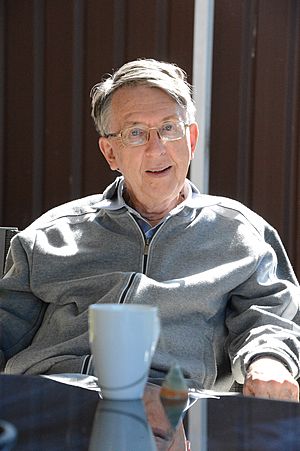R Ian Jack facts for kids
Robert Ian Jack (1935–2019) was a very talented Australian historian. He was also an archivist, which means he looked after old documents. He was a heritage specialist, helping to protect important historical places. He studied old factories and machines (industrial archaeology) and was a musician too.
Contents
Growing Up
Ian Jack was born in Scotland in 1935. His family lived on a farm called Pierbank. His dad was also named Robert, so Ian started using just "Ian" to avoid confusion.
He went to primary school in Dumfries. Later, he won a special scholarship to Ayrshire Academy. He was the top student there and learned to play the organ.
Ian studied history at Glasgow University. He earned high marks and paid for his studies by playing the organ in churches. He then moved to London. There, he earned a special degree in archiving. He also got his PhD from London University. His PhD paper was about a group of old English lords.
In 1961, he moved to Sydney, Australia. He went there to help start up medieval European history courses at the University of Sydney.
His Family
Ian Jack was married four times:
- Sybil Milliner Thorpe
- Stella Charman
- Aedeen Cremin
- Jan Barkley
He had three sons with his first wife:
- Adrian Laurence Robert Jack, who became a lawyer and later a judge.
- Christopher James Edmund Jack, an IT expert who worked with trading systems.
- Antony Ronald Geoffrey Jack, who worked in the medicine industry.
He also had three grandchildren:
- Melissa Rose Jack, a chemistry teacher.
- Tamsin Emily Jack, a zoologist (someone who studies animals).
- Anya Jack, who was still in school when this was written.
Working as a Historian
Ian Jack started teaching history at the University of Sydney in 1961. He traveled all the way from England by ship, through the Suez Canal. He became a senior lecturer in 1965. By 1970, he was an associate professor.
He was the Dean of the Arts Faculty for two terms, from 1974 to 1977. He also led the History Department twice. He was in charge of the Board of Music for 14 years. He retired in 2002. The University of Sydney made him an honorary fellow in 2016.
Starting Historical Archaeology
In 1974, Ian Jack helped create a new study area. It was called Historical Archaeology. He started it with Judy Birmingham at the University of Sydney. They began the first college course in this field in Australia.
This course taught students about history through digging up old sites. Students learned practical skills. They even did digs at places like Hill End. This town was famous for a huge gold nugget found there.
Work at St Andrew's College
Ian Jack was involved with St Andrew’s College for a long time. He held many important roles there. He was a Senior Tutor and a Senior Fellow. He also managed the college's old documents and books. He often played the college organ and organized many music events.
Leading Historical Societies
Ian Jack was the longest-serving President of the Royal Australian Historical Society. He led it from 2003 to 2011. He was also a member of the NSW Heritage Council. This group helps protect important historical places in New South Wales.
He was also a leader in other groups. These included the Blue Mountains Association of Cultural Heritage Organisations. He also led the Hawkesbury Historical Society.
Ian Jack wrote many books and articles. His writings covered topics from Medieval Wales to local history in Australia. He was very passionate about history. He loved researching, protecting heritage, and studying old industries. He was also a skilled musician.
The Australasian Society for Historical Archaeology gives an award in his name every year. It's called the R. Ian Jack Award. It goes to the best honors paper in historical archaeology.
Collecting Books
Ian Jack was a long-time member of the Book Collectors Society of Australia. He wrote articles for their magazine. He loved collecting books. He had a huge collection of medieval books. He was especially interested in books about Joan of Arc. He also collected Australian non-fiction books.
His Passing
Ian Jack passed away in 2019. He had heart problems. He was also battling prostate cancer, but his heart condition was the main cause.


